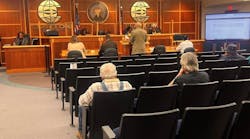Nov. 14 -- For retired police officer John Bell, Fort Worth’s attempt to fix a $1.6 billion pension gap isn’t about getting a raise. It’s about making sure fellow retirees have enough to live on.
Bell, shot three times in 2013 by a man fleeing police, retired three years ago. With an 8-year-old granddaughter he and his wife adopted, Bell worries about life on limited income, but he’s more concerned about city employees who retired before him with smaller pensions.
“When you’re young you don’t think about it, but once you have fixed income it can be difficult,” 71-year-old Bell said. “There’s a lot of guys older than me and the city promised to take care of them.”
The Fort Worth City Council on Tuesday planned to vote on a compromise that includes the city contributing an additional 4.5 percent or about $21 million annually to the Fort Worth Employee’s Retirement Fund. City employees would pay an average of 2.6 percent more of their pay toward their pension.
Instead, the council stalled on the vote, choosing to take up the subject Dec. 11.
The sticking point was a cost of living adjustment that would be 2 percent for the first $30,000 of a pension and 1 percent after that for retirees with at least 25 years of service. It eliminates cost of living for future retirees and reduces the adjustment to 1 percent for current retirees with less than 25 years.
City Manger David Cooke had hoped that plan would be enough to satisfy unions and keep the pension problem away from the Texas Legislature, where a cost of living adjust might be lost altogether.
But Bell and employee unions say it’s not enough.
Manny Ramirez, president of the Fort Worth Police Officers Association, said the compromise is a “step closer to fair and equitable.” Changes to cost of living adjustment for retirees remained the only sticking point for his union, he said, and called on council to direct staff to renegotiate.
The pension package must pass a majority vote of all employees. Fort Worth has just over 6,600 employees and more than 4,400 retirees receiving a pension.
“It will likely fail,” Ramirez said.
Michael Glynn, president of the Fort Worth Firefighters Association, agreed.
“City mismanagement has caused this problem not your employees,” Glynn said. “Now you’re looking for a solution on the back of your employees.”
Fort Worth has worked for about three years to find a solution to the pension gap. Officials say if no action is taken, the city’s $2.3 billion fund could run out of money between 2040 and 2050. Cooke in August proposed the city pitch in 3 percent more, but employee unions wouldn’t budge on changes to the cost of living adjustment. That plan would have cut the adjustment to a 1 percent increase for current retirees with no adjustment for new retirees.
“We have to act or it will run out of money,” Cooke said Tuesday.
The cost of living adjustment is crucial for employees who have already left, retired officer Howard Tokheim said.
When Tokheim was in the traffic division, he was known for being “thrifty,” putting extra money away whenever he could.
Tokheim, who served at the same time as Bell, called it a “back up plan,” something he learned from older officers. He expected the city pension to be solid, but wanted to be safe.
“I didn’t want have to put on another uniform,” he said. “Now I worry I might have to.”
With about 18 years of service in Fort Worth, Bell would no longer qualify for the cost of living adjustment. To help support his granddaughter, he took another job — at the same Haltom City auto shop, 2nd Opinion Auto, where he was shot.
“I’m trying to raise an child at 71 years of age, and that’s not cheap,” he said.
For taxpayers, the pension compromise tabled Tuesday amounts around $113 million annually after the 4.5 percent increase. Since the budget has been passed for 2019, Cooke said the $21 million needed this year would come from cuts to some city departments. Between $3 million and $5 million would likely come from the general fund.
Last year, taxpayers contributed more than $90 million to then fund while employees paid in about $32 million. More than $190 million was paid out.
Movement on the pension faltered Tuesday when Councilman Jungus Jordan was joined by councilmen Carlos Flores and Cary Moon in voice concerns over changing the cost of living adjustment. Jordan made an emotional plea, saying the council “loved” city employees and should care for them.
“Once they’re retired they should be safe,” he said. “Their benefits should be protected.”
Councilwoman Kelly Allen Gray abstained for personal reasons and councilwoman Gyna Bivens said she needed more time to consider.
Mayor Betsy Price said that many options, including increased employee contribution, had been on the table throughout the negotiations, and cautioned delaying any longer. Rating agencies earlier this year downgraded Fort Worth’s debt rating.
“None of these are are ideal solutions,” Price said, urging for a compromise.
___ (c)2018 the Fort Worth Star-Telegram Visit the Fort Worth Star-Telegram at www.star-telegram.com Distributed by Tribune Content Agency, LLC.






